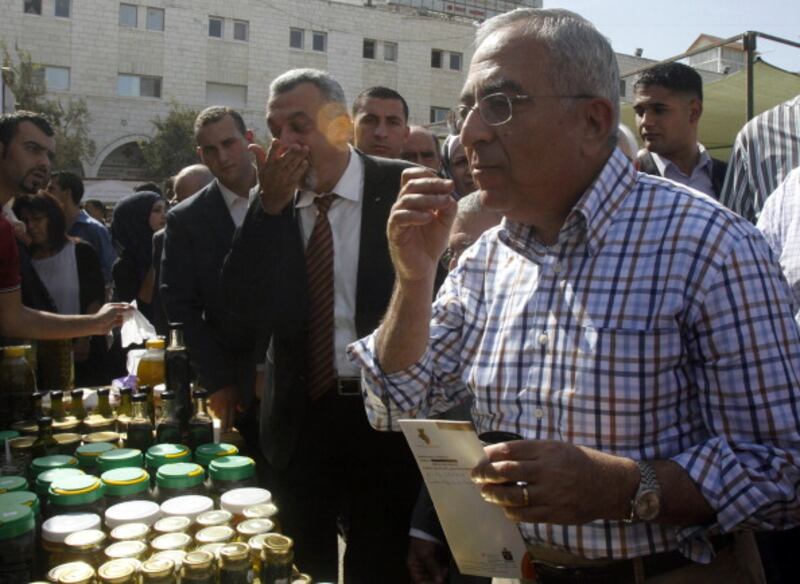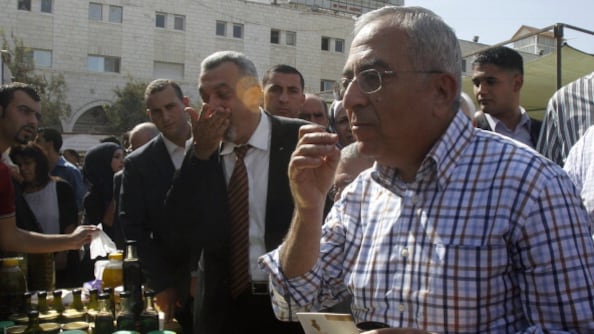Who lost Salam Fayyad? The resignation-dismissal of the respected Palestinian Prime Minister has provoked plenty of finger-pointing. Every Mideast pundit has a favored Western villain: it was intransigent Israel’s fault; overly-Zionist Congress is to blame; evil Bibi Netanyahu did him in; weak President Obama hung him out to dry; it was those obstacle-to-peace settlers. The New York Times’ Thomas Friedman, in fact, couldn’t choose just one—he accused all of the above in his April 24 column.

Such analyses are themselves evidence of a fundamental problem with Fayyad’s tenure: popular as he was in international aid circles and New York Times (and Daily Beast) op-eds—and even among Israelis—Fayyad had no democratic Palestinian constituency to speak of. (Friedman, at least, added other Arab leaders to his hall of blame.) Furthermore, Fayyad’s foreign fan club, seldom holding the Palestinians themselves responsible for anything, did little to coax the populace toward his camp.
Archie Bunker once said of then-President Gerald Ford, “He’s doing a great job for a guy nobody voted for.” However well Fayyad did, his “emergency” prime minister appointment was never ratified by the legislature or the voters.
He did face election in 2006, leading his “Third Way” party, preaching reform of corrupt security forces, clean and transparent government, and Palestinian progress toward independence not through armed struggle with Israel but through socioeconomic progress and democratic institution-building. As a finance minister with a decent record of fighting corruption (for example, he instituted direct deposit of salaries to employee accounts, replacing the existing skim-from-the-bag-of-cash system), he was already admired internationally: he was The Great Palestinian Hope.
And his party won...two seats out of 132; Fatah and Hamas won a combined 129. For the Palestinian voters, there was no Third Way.
Following strife between Gaza and Ramallah, Fayyad was appointed PA Prime Minister. But a Third Way PM in the land of Fatah and Hamas is like an honest accountant grudgingly appointed to oversee two rival organized crime families in the same town. Fayyad proved useful to both sides for a time, as the confidence he inspired internationally secured fantastic amounts of foreign aid—between 15 and 30 percent of the PA’s GDP.
Fayyad worked seriously toward establishing a de facto functioning state and economy. Understanding Israel’s safety concerns, he noted that “as long as the Israelis have no security, the Palestinians will have no security, either.” Between restoring some semblance of law and order, diminishing corruption, and properly channeling enough foreign aid to open dozens of schools and health clinics and to pave 1,000 miles of roads, he engineered GDP growth at a red-hot 9 percent annual rate.
From Israel’s perspective, Fayyad wasn’t perfect. He theatrically threw Israeli settlement goods on bonfires and led raids into Palestinian kitchens to ensure there were no Israeli settlement products present. But if the peace process were to go anywhere, it would be through the widespread renunciation of violence, economic progress and political stability Fayyad promoted.
But “Fayyadism” never controlled the PA. Mahmoud Abbas and his Fatah syndicate still wielded the political power. Once Abbas’s kleptocrats felt Fayyad had outlasted his managerial usefulness, it was ma’a salama, Salam—goodbye.
Though generally ignored by the international press, it is “Abbas-ism” that rules the PA. Abbas makes occasional publicized statements conciliatory to Israel, but he maintains a flirtatious relationship with Hamas, religiously committed to Israel’s destruction. His anti-Israel incitement in PA media, mosques and schools approaches worst-ever levels. He regularly refers to all of Israel as occupied, accuses Israel of “daily killing our unarmed people,” “assaulting Islamic and Christian holy sites,” and “pursuing its hobby—murder and destruction.” He claims (imaginary) Israeli excavations “under the foundations of the [Al-Aqsa] Mosque continue, with the aim of causing its structure to collapse." He glorifies the perpetrators of the most grisly terror attacks against Jews. And he demands peace-process preconditions so unserious that even the Likud-loathing Obama administration won’t bite. The pundits yawn.
A December 2012 Arab Organization for Human Rights report assigned Abbas “complete responsibility” for PA “inhumane practices and human rights violations” against Palestinian civilians, including documented torture of thousands of PA detainees, resulting in many deaths or “chronic illnesses.” Where was the outcry?
Those Palestinians who strive for a prosperous, functioning state while tolerating a Jewish Israel next door are Fayyad’s constituents; those whose Palestinian identity remains defined primarily through the endless struggle to eliminate the Jewish State, no matter how dystopian their own future, are the Fatah/Hamas adherents. Sadly, the population remains heavily in the Fatah/Hamas camps.
Seventy-eight percent of aid to Palestinians—up to 24 percent of GDP—comes from the U.S. and Western countries; couldn’t that leverage have been used to weaken Abbas-ism, and nudge the population toward Fayyad? Might all those NGOs, journalists and diplomats, loudly excoriating every move of Bibi Netanyahu but silently regarding Abbas’s excesses, have swung the population toward Fayyadism?
To such pundits and diplomats now looking to assign blame for Fayyad’s fall, might I suggest: start by looking in the mirror.






